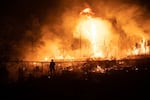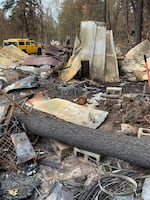
Bill Edge lost his home in Gates during the Santiam Canyon Fire in 2020. Now living in the home he rebuilt, he says it doesn’t feel like home anymore, May 26, 2023. Edge is one of 17 named plaintiffs in a class-action lawsuit against PacifiCorp for causing some of the 2020 fires.
Kristyna Wentz-Graff / OPB
Walking through his yard, Bill Edge pointed out the rubble and downed trees still littering his property nearly three years after the Santiam Canyon Fire burned his home to the ground.
Cars and trucks whiz by on the nearby highway that was never visible to him before the fire, and now he can hear the sound of traffic from inside his replacement modular house.
This place doesn’t feel like his home anymore.
“It’s not what I bought,” he said. “We could never hear the road. We had big trees along the whole road out there. It looked like a park in here. We probably lost 200 trees.”
Edge, 60, is one of 17 named plaintiffs in a class-action lawsuit that blamed the utility PacifiCorp for causing some of the 2020 fires. Last week, a jury decided the company’s Oregon subsidiary Pacific Power was reckless when it chose to keep its power lines on during a major windstorm. So far, the company has been ordered to pay around $90 million in damages for its role in the Santiam Canyon, South Obenchain, 242 and Echo Mountain Complex fires.

Traffic speeds by on Highway 18 in front of Bill Edge’s rebuilt home in Gates, May 26, 2023. “We could never hear the road. We had big trees along the whole road out there. It looked like a park in here,” said Edge.
Kristyna Wentz-Graff / OPB
Edge was awarded nearly $5 million for the cost of his home and emotional pain he suffered when he was forced to flee.
“I still have nightmares every night,” Edge said. “I don’t want to be here, to tell you the truth. I don’t like it here anymore. They took my park away. Like I told them in court, it was my little paradise.”
Edge is one of many Oregonians who lost their homes in the 2020 fires and are still working to rebuild their lives — often in unfamiliar landscapes that were scorched and stripped of trees.
Plaintiffs in the lawsuit say they want PacifiCorp to end its fight in the case and pay the compensation owed to people who are still coping with tremendous losses. PacifiCorp has said it plans to appeal the decision.
Rachelle McMaster, a plaintiff whose house in Otis burned in the Echo Mountain Complex Fire, was awarded more than $4.5 million in damages. She’s hoping to leave her tiny, cramped apartment in Lincoln City and move back to the country where she can look up at the stars.
“When I got the verdict, I realized that I actually get to have my house again,” she said. “I get to go home, and there’s no words to explain how wonderful that is. I can actually finally start realizing and seeing an end to this ongoing nightmare.”
Efforts to rebuild homes and communities that burned in the 2020 fires have been slow, expensive and painful. The fires burned more than 4,000 homes and about a million acres of land across the state. The Federal Emergency Management Agency reports more than $500 million in spending on wildfire recovery in Oregon so far, and officials say it’s far from over.
Wildfire victims and their advocates say the PacifiCorp ruling is a lifeline after nearly three years without enough insurance money, emergency funding or government support for people who lost everything and are struggling to start over.
Shocking verdict
The night before the jury announced its decision in the class-action case against PacifiCorp, Edge couldn’t sleep. He set up his computer to watch the court proceedings even though he knew they wouldn’t start for hours.
When the judge finally announced the verdict, he said, it felt like all the blood drained out of his body.

(Left to right) Orion, Dimond, and Bill Edge, on their property in Gates, May 26, 2023.
Kristyna Wentz-Graff / OPB
“You’re almost in shock,” he said. “I think I cried for five, six hours. And it was a weird cry because it was a happy cry but it was sad at the same time.”
McMaster had a similar experience sitting in the courtroom.
“I thought I was going to pass out,” she said. “Honestly, I didn’t think that we had won. I figured that once again, Pacific Power had managed to sway the jury, and that they didn’t understand exactly what all of us had went through during the fires.”
She drove to Portland to hear the verdict because she had joined the case to represent her low-income and elderly neighbors who all lost their houses in the mobile home park where she lived. She tearfully hugged friends and family outside the courtroom after hearing the decision.

Plaintiff Rachelle McMaster wipes tears from her eyes as one of her attorneys greets her after a jury in Portland, Ore., on Monday, June 12, 2023, awarded her $4.5 million in non-economic damages and about $150,000 in economic damages after finding the electric utility PacifiCorp liable for wildfires in 2020.
Andrew Selsky / AP
“It was so incredibly emotional to actually realize that they heard us, and they believed us and they understood that we wanted Pacific Power held accountable,” she said.
Pacific Power now faces the largest penalty an Oregon utility has ever faced for its role in starting wildfires. The wildfire survivors said they still remember the fires in a visceral way because of what happened to them.
Lingering trauma and stress
On Labor Day in 2020, McMaster had to evacuate one place after another as the Echo Mountain Complex Fire burned near the coast.
“We’d get to one place and then we’d get evacuated and then we get to another place and we’d get evacuated,” she said. “It was chaos.”
She didn’t know where the fire would move next and didn’t know if she would survive.
“We got stuck in the middle of [Highway 101] for at least an hour,” she said. “That was so nerve wracking.”
Soon after, she heard that her home was gone.
“It literally took the floor out from under me,” she said. “I collapsed. Everything after that, trying to fight to get assistance, trying to fight to get information … it was just so emotionally draining.”
She had owned the home and rented the land under it in the mobile home park, but she didn’t have insurance on the house. After the fire, she found an apartment in nearby Lincoln City and found out that the park she had lived in was sold. She hasn’t heard anything from the new owner about whether anyone will be allowed to move back.

Evidence suggests this fire at Gates School is one of several sparked by power lines on Sept. 7, 2020. A firefighter called 911 to report the fire that started when high winds blew trees into power lines.
Courtesy of U.S. Forest Service / Courtesy of U.S. Forest Service
McMaster said the harrowing experience left her with post-traumatic stress disorder and a lot of worries about future disasters.
“I never thought that we would have anything like this on the Oregon Coast,” she said. “I mean, it’s the Oregon Coast. We’re right next to the ocean.”
She wishes she would have brought important documents with her when she evacuated because “it was a nightmare trying to replace them” and she is grateful for all the people who helped her along the way.
“Many of them were strangers before the fire, and now they’re my family,” she said. “They are the ones I call with my happy news. They are what’s helped me through this whole thing.”
As her phase of the lawsuit against PacifiCorp wraps up, McMaster said she wants to see changes from the company “so that this doesn’t ever happen again.”
Rebuilding still underway
Marion County Commissioner Danielle Bethell said the amount of time and effort it took to clean up after the fires and start rebuilding was tremendous because hazardous waste and dangerous trees all needed to be removed under the supervision of the Environmental Protection Agency and FEMA.

Photos of the fire that destroyed Bill Edge’s home in Gates during the Santiam Canyon Fire in 2020.
Kristyna Wentz-Graff / OPB
“It was really traumatizing for the residents of the canyon because it took so long for them to be able to even step on their property, return to their space and take a breath and say, ‘OK, now, how can I start recovery?’” she said.
When people could get back onto their properties to start rebuilding, Bethell said, the cost of lumber skyrocketed 400%.
“People literally could not afford to go buy the wood to frame their home to build a home,” she said.
Marion County lost 724 homes in the fires, and so far only about 60% have received permits to rebuild.
For Edge, the 2020 fires pulled his life apart. Along with losing his home and all his belongings, he lost his job at the local market, and his marriage disintegrated.
Like many others, when he was finally ready to rebuild, he struggled to find contractors to do the work needed to make his manufactured home legally livable.
“I was one of the first people to buy something, but it sat out there in my yard for like four or five months before they could come and assemble it,” he said. “They were so backed up with people trying to assemble trailers back then.”
The COVID-19 pandemic had created a shortage of workers just when the fire survivors needed them most. Edge made countless calls to find electricians and plumbers who could help finish his new house. Then, there was the person he called to pour a concrete pad.
“Ripped me off for five grand,” Edge said. “That was a sad story.”
The endless wrong turns only fed Edge’s desire to sell his property as soon as possible. Finding a buyer has been a challenge with the hollowed out landscape. He now works as a driver for DoorDash and is pouring his money into sprucing up the place.
Bethell said she grew up experiencing homelessness, and after the fires she threw herself into helping people who lost their homes.
“I became intimately involved with these wildfire survivors,” she said. “This recovery is very personal to me because these people are my friends and my neighbors. I am relentless when it comes to helping people.”
She said she’s been frustrated by how long it has taken government agencies to provide recovery money to people, as well as the problems residents have encountered while rebuilding.
“It has not been easy,” she said. “We have learned how awful the world really can be when somebody is at their lowest low. We’ve had … landowners be victimized by construction companies that just ran off with all of their recovery money.”

In December 2022, workers with the nonprofit Christian Aid Ministries rebuild a home that burned in Lyons.
Courtesy Christian Aid Ministries
Renters left with few options
Bethell estimates about 20% of county residents who lost their homes were renters who didn’t own property. Many renters needed help relocating to other towns because their landlords weren’t planning to rebuild.
“Most of them are now not in the communities where they were before,” she said.
That’s what happened to Johne Martin, a retiree who lost his rental house near Gates in the fire and couldn’t find another place to live nearby. He bought a travel trailer with some of the money he got from his insurance and moved onto his daughter’s property about 30 miles away in Marion.
Last month, he went back to see his former home site and ran into his old neighbor, Stan Harrison. On the property where both of their rental homes used to sit, Harrison is now living in a trailer because it was all he could afford.
“I’d rather be living in a single-wide mobile home type thing like I used to have,” Harrison said.
“That’s what I want, too, but there ain’t no way,” Martin said. “I can’t afford it.”
Harrison said he was free of debt before the fires, but has since had to borrow money to find a place.
Both Harrison and Martin remember watching electrical transformers popping and power lines falling on the night of the fire. They think Pacific Power should have shut off the electricity. They’re part of the larger class involved in the lawsuit against PacifiCorp, but they aren’t named plaintiffs, so it’s not clear yet what damages they will receive.
“They owe big,” Harrison said.
“Yeah, I lost everything,” Martin said.
They are both skeptical that PacifiCorp will end up paying them to help offset their losses.
“They might have the money but I’ll be danged if they’ll share it,” Martin said.
“We’re the little people,” Harrison said. “We don’t count.”
In court, PacifiCorp defended its decision not to shut off the power in 2020 and argued it has made significant new investments in wildfire protection through tree trimming, replacing power lines and hiring meteorologists to monitor weather-related risks. The company blamed climate change for the severity of the 2020 wildfires and lamented that the victims of the fires “can’t sue climate change.”
Shortly after the jury’s verdict, the company made it clear it would fight any type of payout.
“We are disappointed in and disagree with the jury’s decision in this case. As previously stated, we will pursue appeals and are confident that we will prevail,” the company said in a statement.
Wildfire response still ongoing
According to the Oregon Office of Emergency Management, several wildfire recovery assistance programs for victims of the Labor Day fires are authorized to continue for years to come.
Melissa Baurer, director of integrated health and outreach for Santiam Hospital and Clinics, oversees a program that has helped more than 1,000 households with wildfire recovery in the Santiam Canyon.

A photo of the burned remains of Bill Edge's home in Gates after the Santiam Canyon Fire in September 2020.
Courtesy Bill Edge
Right after the fires, Baurer’s team started getting people into hotels and making sure they had basic necessities. They helped refill prescriptions for medication that was lost in the fires and replaced birth certificates and identification.
Their work gradually shifted to helping people rebuild or relocate, providing household supplies and tools and guiding them through the long and complicated process for getting assistance through the FEMA or state programs. They’re still working with 107 households, 16 of which are renters who have very few options for housing in the area.
Less than 2% of all the households her program has worked with had enough insurance to cover their recovery costs, she said. Some just can’t afford it.
“I think a lot of things were put to the test with this fire, and we found out like, ‘Oh, wow, if we were to really prepare for something like this it would take a lot to be fully prepared.’”
She was surprised by just how much work it took to get assistance through FEMA.
“Paperwork had to be followed up with and we had to track that. Sometimes we tracked it over a year or two timespan before we were able to get those approved,” she said.
A local fundraising effort created the Santiam Canyon Wildfire Relief Fund, which provided assistance without so much red tape.
“That has been a lifesaver for survivors as well as case managers,” she said. “Once we request it, we can get a check within a day or two.”
Nearly three years after the fires, Baurer said, people have spent their insurance money and dipped into their savings and retirement accounts to cover rebuilding costs. Some families that haven’t been able to rebuild yet are still living in separate trailers because they can’t all fit in one.
“We have families that still don’t have a real bed to sleep on. They want to be able to have dinner around the table again with their kids,” she said. “One girl said she wishes an angel would come and finish their home for them. That was really hard.”
She’s watched people’s health decline as the stress of recovery has mounted.
“We’ve lost survivors. I guess you can’t say the fire has caused these deaths,” she said. “But in a way, I feel like they have because the stress has made it really hard on families.”
More wildfire protections in the works
While the PacifiCorp case has brought attention to the victims of four wildfires, many other fires burned in the 2020 wildfire season. Rebuilding challenges are common across many of the fires, regardless of cause.
State Sen. Jeff Golden, D-Ashland, said people who were uninsured or underinsured in Southern Oregon are still struggling to rebuild after fires destroyed much of Phoenix and Talent — including many mobile home parks.

State Sen. Kate Lieber, D-Beaverton and Southwest Portland, left, confers with Sen. Jeff Golden, D-Ashland, at the Oregon Capitol in Salem, March 20, 2023.
Kristyna Wentz-Graff / OPB
“Given the scale of the catastrophe, you know, you could take the point of view that it’s miraculous how many people have recovered,” he said. “We didn’t know what we were gonna do in the wake of the fire. Or you could say it’s just unacceptable how many people still haven’t been able to put their life back together.”
On Thursday, Jefferson Public Radio reported that some Southern Oregon fire survivors wouldn’t be able to move into homes built for them because they had become infested with mold. The boondoggle will cost around $20 million to correct, and it’s unclear when more than 100 families will finally get a permanent home.
Golden said he wants to reduce the chances of more Oregonians losing their homes and communities to wildfire as climate change increases fire risk.
He helped pass a massive wildfire reform bill in response to the Labor Day fires that required utilities to file wildfire risk reduction plans and directed $220 million in funding to wildfire detection, forest management, firefighting resources and reducing fire risk around homes and communities. PacifiCorp said it plans to spend $430 million on wildfire mitigation efforts in coming years.
Golden says lawmakers moved quickly to pass Senate Bill 762 in 2021 knowing they would need some “course-correcting” as the reforms took shape. But a stalemate among lawmakers this session has prevented some of that course correction from moving forward.
He is sponsoring bills that would create a statewide network of neighborhood-based wildfire risk reduction cooperatives, secure ongoing funding for wildfire protection and revise controversial plans to create a statewide wildfire risk map.
Those bills were all on hold as lawmakers worked to end a Republican walkout that started last month. Last week, lawmakers struck a deal that could give Golden’s bills a chance to pass before the end of the session.
“We are talking about life and death damage if we abandon these bills,” Golden said at a recent press conference. “Protecting our communities from quite literally burning to the ground is going to take an intense and somewhat costly effort. We’ve seen it and we’re gonna see more of it.”
Nightmare continues
Edge opened a glass-doored cabinet in his dining room — one of many pieces of donated furniture that have helped replace what he lost.
He pulled out a couple molten metal objects that were left in the rubble of his home.
“This is a motorcycle,” he said, holding up a palm-sized metal pancake.

Bill Edge holds what remains of his motorcycle, May 26, 2023, found in the rubble of his former home in Gates, destroyed in the Santiam Canyon Fire in 2020.
Kristyna Wentz-Graff / OPB
Edge said when he joined the lawsuit against PacifiCorp he felt like he had nothing left to lose.
“I don’t know what made me do it,” he said. “I was like, I just can’t believe I just lost everything I owned. Everything that meant something to me is gone.”
Since the fire, Edge has been diagnosed with PTSD and sees a counselor occasionally.
He said he knows PacifiCorp is going to use the courts to resist paying him, and that means his nightmare will continue until the case is resolved.
“They wanna keep making it sound like they have no liability,” Edge said. “They don’t take any responsibility for what happened. Just pay the people and let them move on and try to find peace. I mean, why prolong it? You just keep torturing the people you’ve already tortured.”
Edge has a dream of using his damage award to move to Hawaii. But until the money arrives, he said, that dream will have to wait.
“I’m sore, I’m sad. I’m hurt, I’m happy,” he said after the verdict was announced. “We won, but I don’t believe any of our bank accounts look any different. So the process is still going on. We still gotta get up and go to work every day, we still gotta pay our bills. Nobody’s gonna do that for us.”

Bill Edge stores mementos in a glass-doored cabinet in his dining room, one of many pieces of donated furniture that have helped replace what he lost during the Santiam Canyon Fire in 2020. Edge is one of 17 named plaintiffs in a class action lawsuit that were recently awarded a financial settlement, holding Pacific Power accountable for choosing to keep power lines on during a major windstorm.
Kristyna Wentz-Graff / OPB
